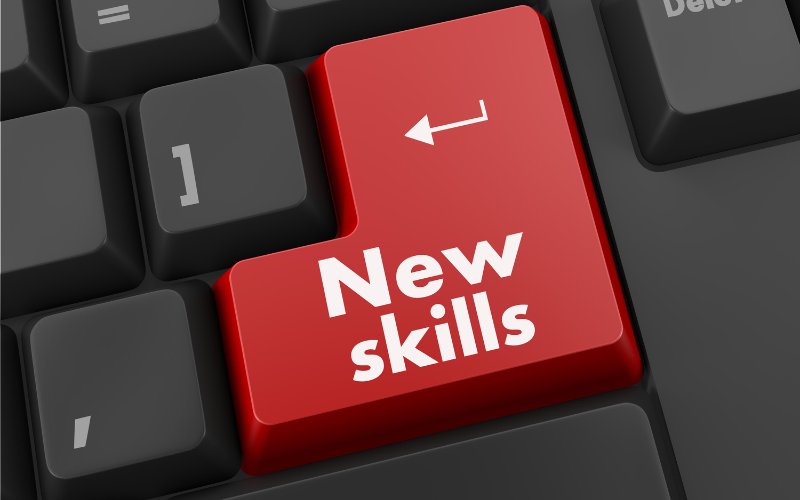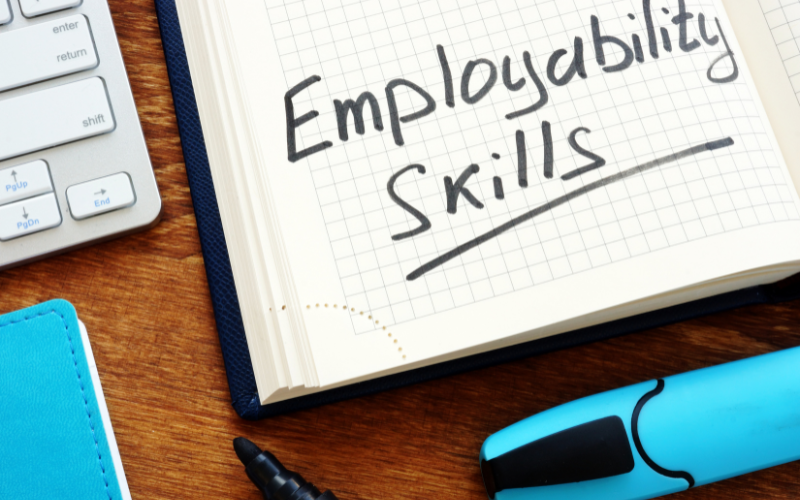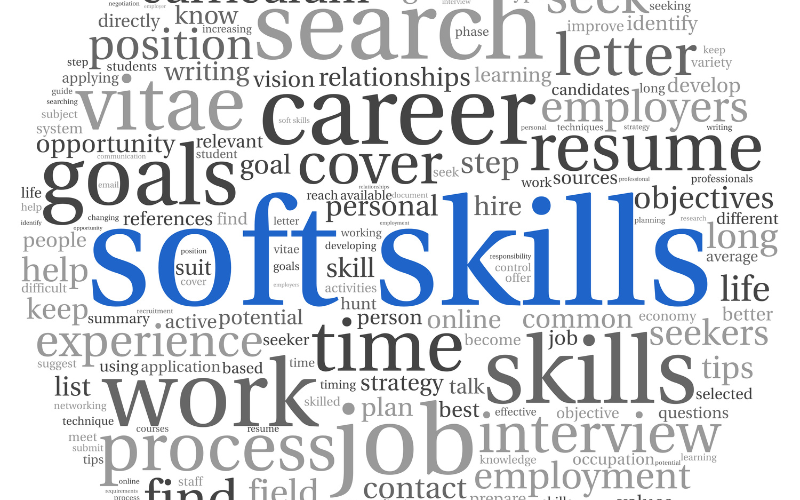
Employability skills are vital because they help you get and keep a job. These skills include technical know-how, organisational skills, and soft skills. This article explains why are employability skills important for your career. These skills are crucial for career readiness, ensuring that individuals are well-prepared to meet the demands of the modern workplace.
Quick Insights
- Employability skills, including technical and soft skills, are essential for job success, enabling individuals to secure and excel in their careers.
- In the modern workplace, employers prioritize skills such as communication, problem-solving, and adaptability as they contribute significantly to organizational effectiveness and competitiveness in the job market.
- Developing employability skills through practical experiences, such as internships and project-based learning, is crucial for enhancing career readiness and competitiveness.
Understanding Employability Skills

Employability skills combine technical and soft skills crucial for job success, encompassing a broad range of workplace competencies that enhance a person’s capacity to secure and retain employment. These skills focus not just on knowledge but also on applying that knowledge in a professional setting.
Key components of employability skills include teamwork, communication, leadership, and problem-solving abilities. Organisational skills, which involve effective planning, prioritization of tasks, and the ability to multitask to meet deadlines, are also essential. These important employability skills, often referred to as “workplace skills,” are crucial in meeting challenges and enhancing one’s employability in today’s competitive job market. Career and Technical Education (CTE) programs emphasize the development of both technical and soft skills.
Lacking these skills can make early career challenges tough to handle. Improving employability skills and personal attributes is crucial for not only securing jobs but also achieving success in college, careers, and life. Adaptability and flexibility allow individuals to adjust quickly to new situations and stay positive during changes.
Types of Employability Skills
Employability skills can be broadly categorized into three main types: technical skills, soft skills, and formal education and training. Understanding these categories helps individuals develop a well-rounded set of skills that are essential for career success. Examples of soft skills include communication, teamwork, problem-solving, and organisational skills.
Technical Skills
Technical skills are specific abilities required to perform particular tasks or roles within an industry. These skills are often acquired through formal education, training programs, or hands-on experience. Examples of technical skills include proficiency in programming languages, data analysis, and software applications. These skills are crucial for executing job-specific tasks and are often prerequisites for many positions. Developing technical skills ensures that you can meet the technical demands of your job and stay competitive in your field.
Soft Skills
Soft skills, in contrast, are non-technical abilities that are valuable across various situations and industries. These include communication skills, teamwork, problem-solving, and time management. Soft skills are essential for effective interaction, collaboration, and conflict resolution in the workplace. They help build strong relationships with colleagues, clients, and customers, making them indispensable for professional success. While technical skills can get you the job, soft skills are what help you excel and advance in your career.
Importance of Employability Skills in the Modern Workplace

In today’s fast-paced and ever-changing work environment, employability skills have become indispensable. Problem-solving, decision-making, critical thinking, and analysis are essential skills that enable employees to navigate complex situations and contribute effectively to their organizations. These skills ensure a productive and smoothly functioning workforce, which is why employers place such high value on them. Continuous professional development is essential to keep these skills sharp and relevant in a rapidly evolving job market.
Soft skills, such as communication and interpersonal abilities, are equally important. While technical skills can be taught, soft skills are much harder to instill and are critical for performing well in various roles. Employability skills contribute to professional success and open up more career opportunities.
Maintaining effectiveness in dynamic work environments requires flexibility and adaptability. As remote work and digital transformation become the norm, digital literacy emerges as a fundamental skill. Proficiency in digital tools enables employees to make informed decisions and address operational gaps effectively.
Key Employability Skills Employers Seek

Today’s employers look for candidates with a diverse set of employability skills crucial for career success, including communication skills, problem-solving abilities, organisational skills, and teamwork.
These employability skills are often transferable skills, meaning they can be applied across various roles and industries, making them highly valuable to employers.
Let’s delve deeper into these key skills to understand why they are highly valued and how you can develop them.
Communication Skills
Communication skills involve the ability to express ideas clearly, listen effectively, and respond appropriately. Effective communication encompasses both verbal and non-verbal forms, enhancing professional interactions and ensuring that messages are conveyed accurately. This skill is considered the most important in the workplace, as it facilitates collaboration and helps in resolving conflicts, allowing individuals to communicate effectively.
Improving communication skills can be achieved through various methods. Practicing writing reports and assignments regularly can help refine written communication, while engaging in public speaking can boost verbal communication. Mastering these skills is essential for professional success and can significantly impact your career trajectory.
Problem-Solving Skills
Logical thinking and solution-finding are at the core of problem-solving skills and critical thinking skills. This essential employability skill involves identifying issues, thinking outside the box to find solutions, and assessing their effectiveness. Workplaces highly appreciate employees who focus on uncovering and implementing effective solutions.
Enhancing problem-solving skills can be done at any level. Enrolling in courses focused on problem-solving, participating in brainstorming sessions, and taking on challenging projects are practical ways to develop this skill. Consistently practicing problem-solving will make you a valuable asset to any organization.
Teamwork and Collaboration
Teamwork and collaboration are crucial for achieving common goals in any workplace. These skills involve working effectively with colleagues, sharing resources, and combining ideas to reach a consensus. Clear communication and trust among team members are the foundation of successful teamwork.
Developing teamwork skills can be achieved through various activities. Participating in clubs, leadership roles, student councils, and community projects helps individuals build interpersonal skills and improve their leadership skills and ability to work in a team.
Employers look for individuals who can compromise, share ideas, and provide constructive feedback within a team setting.
Self-Management and Professionalism
Self-management involves taking responsibility for actions and striving to execute tasks effectively. It includes organisation, accountability, demonstrating initiative, and organisational skills. Punctuality and reliability showcase professionalism and commitment to one’s job. A strong work ethic is fundamental to self-management, showcasing your dedication and reliability to employers.
Effective self-management can enhance career prospects by showcasing an individual’s dedication and reliability. It fosters trust between employees and their managers, especially in remote settings. Developing self-management skills is crucial for long-term career success.
Self-Development and Reflection
Self-development and reflection are essential employability skills that can significantly enhance your career trajectory. Self-development involves taking proactive steps to improve your skills and knowledge, while reflection requires critically analyzing your experiences to learn and grow from them. These skills are crucial for continuous personal and professional growth.
To develop self-development and reflection skills, consider the following strategies:
- Set Goals and Priorities: Establish clear, achievable goals for your learning and development. Prioritize these goals to focus on the most impactful areas.
- Seek Feedback: Regularly ask for feedback from colleagues, mentors, and supervisors. Use this feedback constructively to guide your self-improvement efforts.
- Reflect on Experiences: After completing tasks or projects, take time to reflect on what went well and what could be improved. This practice helps you learn from your experiences and apply those lessons in the future.
- Adopt a Growth Mindset: Embrace challenges and view failures as opportunities to learn. A growth mindset fosters resilience and a willingness to take on new challenges.
- Practice Self-Awareness: Develop emotional intelligence by being aware of your emotions and how they affect your behavior. This awareness can improve your interactions with others and enhance your decision-making skills.
By focusing on self-development and reflection, you can:
- Improve Performance: Continuously enhancing your skills and knowledge leads to better job performance and productivity.
- Enhance Career Prospects: Demonstrating a commitment to self-improvement can make you a more attractive candidate for promotions and new job opportunities.
- Boost Confidence: Achieving your development goals can increase your self-esteem and confidence in your abilities.
- Foster a Positive Mindset: A growth-oriented mindset helps you stay motivated and open to new opportunities.
- Build Strong Relationships: Emotional intelligence and self-awareness improve your ability to work effectively with others, fostering strong professional relationships.
Career Advancement and Growth
Career advancement and growth are critical employability skills that enable you to achieve your long-term professional goals. Career advancement involves seeking opportunities to move up the career ladder, while growth focuses on expanding your skills and responsibilities within your current role. Both are essential for sustained career success.
To develop career advancement and growth skills, consider these approaches:
- Identify Strengths and Weaknesses: Conduct a self-assessment to understand your strengths and areas for improvement. Develop a plan to leverage your strengths and address your weaknesses.
- Seek New Challenges: Look for opportunities to take on new projects, roles, or responsibilities that push you out of your comfort zone and help you grow.
- Build Relationships: Network with colleagues, mentors, and industry professionals. Strong relationships can provide support, guidance, and opportunities for career advancement.
- Understand Organizational Goals: Gain a deep understanding of your organization’s objectives and find ways to contribute to its success. Aligning your efforts with organizational goals can make you a valuable asset.
- Stay Informed: Keep up-to-date with industry trends and developments. Continuous learning and professional development are crucial for staying competitive in your field.
By focusing on career advancement and growth, you can:
- Improve Career Prospects: Actively seeking growth opportunities can lead to promotions and new job offers.
- Increase Earning Potential: Advancing in your career often comes with higher salaries and better financial stability.
- Enhance Job Satisfaction: Taking on new challenges and responsibilities can make your work more engaging and fulfilling.
- Develop a Sense of Purpose: Contributing to your organization’s success and achieving your career goals can provide a strong sense of purpose and accomplishment.
- Make a Positive Impact: Your growth and success can positively impact your organization and community, making your work more meaningful.
By integrating these strategies into your professional life, you can develop the employability skills necessary for career advancement and long-term success.
How to Develop Employability Skills

Cultivating employability skills involves self-awareness and practical experiences. Begin by identifying your existing skills and listing your work activities and responsibilities. Participation in extracurricular activities and practical experiences can help in demonstrating and refining these skills. Developing these skills is crucial for career advancement, as they enhance your ability to take on new challenges and responsibilities.
Let’s explore some effective methods in detail.
Formal Education and Training
Formal education and training provide the foundational knowledge and qualifications needed for specific careers. This can include degrees, diplomas, certificates, and specialized courses. Formal education not only imparts technical skills but also fosters critical thinking and problem-solving abilities. Training programs, workshops, and apprenticeships further enhance these skills, ensuring that individuals are well-prepared for the demands of their chosen professions. Investing in formal education and training is crucial for acquiring both the technical and soft skills necessary for career advancement.
Informal Learning and Experience
Informal learning and experience encompass the skills and knowledge gained through everyday activities, such as volunteering, extracurricular involvement, and personal projects. These experiences can significantly contribute to skill development, particularly in areas like communication, teamwork, and problem-solving. Engaging in diverse activities outside of formal education allows individuals to develop interpersonal skills and gain practical insights that are highly valued in the workplace. Informal learning complements formal education by providing real-world experiences that enhance employability.
By understanding and developing these different types of skills, individuals can build a comprehensive skill set that enhances their employability and prepares them for a successful career.
Project-Based Learning
Project-based learning effectively develops employability skills like collaboration, critical thinking, and practical application. CTE programs, for instance, engage students in real-world challenges and projects to develop these skills.
Examples of project-based learning tasks include creating prototypes, solving community problems, and designing marketing plans. These activities not only teach problem-solving and teamwork but also provide hands-on experience that is invaluable in any career.
Internships and Work Placements
Internships and work placements are crucial for gaining practical insights into workplace cultures and expectations. These experiences allow individuals to apply their employability skills in real-world settings, making them more competitive in the job market. Gaining industry experience through internships and work placements is invaluable for understanding workplace dynamics and expectations.
Internships and work placements offer hands-on experience that academic settings may lack. This exposure clarifies the practical applications of theoretical knowledge and readies you for the modern workplace’s demands.
Extracurricular Activities
Extracurricular activities play a significant role in developing employability skills and academic skills. Participating in activities such as student councils, sports teams, and community projects can enhance leadership, teamwork, and time management skills. These activities help in developing practical skills that are directly applicable in professional settings.
Balancing various commitments and responsibilities through extracurricular activities fosters improved time management skills and builds interpersonal relationships with diverse groups. These experiences are essential for developing life skills that contribute to both personal growth and career readiness.
Online Courses
Taking online courses to improve employability skills is a vital step for students. These courses offer flexible learning opportunities that can be tailored to individual needs, allowing students to enhance their skills at their own pace. Online courses provide access to a wide range of essential skills, from technical expertise to soft skills like communication and leadership, which are crucial for career success.
For teachers, offering online courses to students is an invaluable way to prepare them for the modern workplace. It allows educators to integrate real-world skills into their curriculum, ensuring that students are not only academically prepared but also ready to meet the demands of employers. By incorporating online courses, teachers can bridge the skill gaps that often exist between academic knowledge and workplace requirements.
One of the standout options for students and teachers alike is the 220 Youth Leadership's Employability Skills online course. This course is designed specifically to equip young people with the skills they need to succeed in their careers. It covers a comprehensive range of topics, including communication skills, problem-solving, and teamwork, all of which are highly sought after by employers. The course's structure encourages critical thinking and the application of knowledge in practical settings, making it an excellent choice for those looking to develop employability skills.
The Importance of Employability Skills Today

In wrapping up, it's clear that employability skills are the cornerstone of career success in the modern workplace. From effective communication and problem-solving to teamwork, digital literacy, and emotional intelligence, these skills equip individuals to excel in their professional lives. We've discussed the importance of developing these skills through project-based learning, internships, and extracurricular activities. Teachers have a pivotal role in guiding students to enhance these skills, ensuring they are ready to meet the demands of today's workforce.
By focusing on improving employability skills, you're not just preparing for a job, you're building a robust foundation for a prosperous career. Begin this journey today and pave the way for a successful future!
Common Questions On Employability Skills
What are employability skills and its importance?
Employability skills are the essential skills, personal qualities, and values that enable individuals to succeed in the workplace. These skills include effective communication, motivation, and initiative, and are crucial for professional success. They are important as they enhance your ability to secure and excel in your career, making you a valuable asset to any organization. These skills directly impact job performance, making you more effective and efficient in your role.
Why are job skills important?
Job skills are important because they equip individuals with the necessary tools to perform tasks effectively and efficiently in their roles. They increase employability, allowing individuals to adapt to various job requirements and contribute positively to their organizations. Mastering job skills also opens up more career opportunities and paves the way for professional growth.
How can employability skills help you in the future?
Employability skills can significantly impact your future by making you more adaptable to changes in the job market and workplace environments. They prepare you to handle diverse tasks, solve problems, and work collaboratively, ensuring you remain competitive and relevant in your career. These skills also foster personal growth and lifelong learning, contributing to sustained professional success.
Why is it important for you to identify your employability skills?
Identifying your employability skills is crucial because they enhance your attractiveness to employers and increase your career opportunities. Understanding your skills allows you to leverage them effectively in job applications and interviews, showcasing your strengths and potential. These foundational skills are often transferable and essential for long-term professional success.


